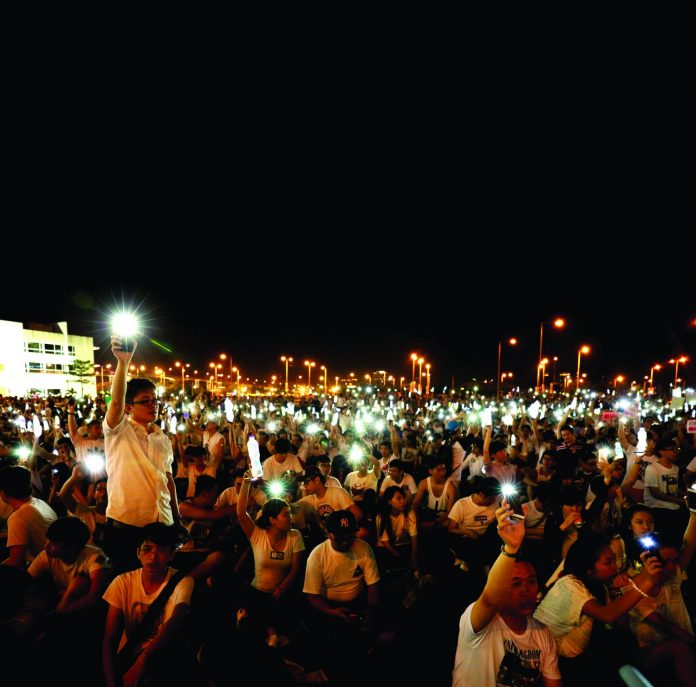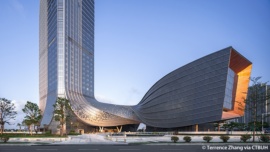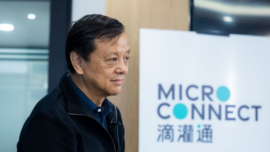“The gap between the promises of political marketing and the actual performance of the [Macau] Government gradually evolved from low performance legitimacy (which emphasises government performance) into procedural legitimacy (which concerns the procedures for choosing the government) as citizens questioned the capacity of the existing political institutions to deliver the performance they demanded,” according to Wilson Wong, Associate Professor of the Department of Government and Public Administration at the Chinese University of Hong Kong.
He and his doctoral student Ying-Ho Kwong have extensively studied how Macau governments use political marketing and they have come to the conclusion that “the political marketing employed by Chui’s government has been a failure. Although he has expended much effort on inventing his political brands of ‘sunshine government’ and ‘scientific Administration,’ the actual gap between performance and public expectations remains.”
Wilson Wong’s work addresses in detail the implications of what happened in 2014 with the “controversy” surrounding the Welfare Package for Designated, Incumbent and Former Chief Executives and Principal Officials bill, which “illustrated how clearly the public realised that the widespread political marketing campaigns by Chui’s Administration amounted only to public relations and further exposed the problem of the structural legitimacy deficit.”
 In the research paper Political Marketing in Macao: A Solution to the Legitimacy Gap for a Hybrid Regime? published last year Wong and Kwong clearly state: “This welfare package made the public realise that the government was insincere about public consultation even in the case of a highly controversial issue, and showed that the problem of ‘black box operation,’ dating back to the previous Administration, remained unresolved.”
In the research paper Political Marketing in Macao: A Solution to the Legitimacy Gap for a Hybrid Regime? published last year Wong and Kwong clearly state: “This welfare package made the public realise that the government was insincere about public consultation even in the case of a highly controversial issue, and showed that the problem of ‘black box operation,’ dating back to the previous Administration, remained unresolved.”
Also, the 2014 events “convinced the public that the political marketing efforts of the MSAR Government amounted to theatre, bringing no real change and no true commitment from the government.”
The so-called Welfare Package began when the government proposed a bill granting generous retirement benefits to top officials, known universally as a ‘golden handshake.’ In the ensuing public demonstration, which took place on May 25, 2014, 20,000 protestors marched from Tap Seac Square to Nam Van Lake (Macau’s biggest protest since the handover, although police post much lower figures).
On May 26, the Chief Executive requested the Legislative Assembly to cancel its agenda and vowed to resubmit a revised perks bill, thereby placing the controversial bill on hold. The answer the next day: more than 7,000 protesters responded to the call of demonstration organisers by besieging the Legislative Assembly demanding the government withdraw the bill. Legislators subsequently cancelled the final vote, although the government refused to scrap the bill.
Finally, on the morning of May 29, the Chief Executive announced at a special press conference that he had decided to shelve the government’s controversial perks bill.
The demonstrations of May 2014 were the largest, and the ones that had the most impact, but were neither the first nor the last.
Tsoi Weng Kuan, a senior technician at the Macau Foundation Research Centre in the area of policy research and elites, is the author of the most comprehensive study on this subject.
“The political marketing employed by Chui’s government was a failure. Although he expended much effort to invent his political brands of ‘sunshine government’ and ‘scientific administration,’ the gap between actual performance and public expectations remains” – Wilson Wong
He argues, for example, that “social movements tend to be more frequent, as the masses opt for immediate means of expression to capture the attention of the Administration.” Tsoi lists other differences: while in the first years after reunification the realisation of the social movements “focused on 1 May, 1 October and the MSAR Establishment Commemorative Day, now the realisation is never limited to these dates.”
“The dimension of social movements,” he continues, “is to grow in a progressive way: until the reunification, in the manifestations of the population were more attentive, the participants were not more than a hundred, while in some movements organised by workers’ associations and pro-democratic associations the number of demonstrations was higher [at] 2,000, representing a growth of several times.”
How is this growing interest of the population due to street demonstrations justified?
“Because of the lack of an effective means of communication with the Government and the lack of representation within the Assembly, the same associations often opt for a strong form of expression to gain the attention of the community,” writes Tsoi Weng Kuan in Evolution of Civil Society in Macao after Reunification – a reflection on social movements in recent years (2014).
This researcher, with a Ph.D. from Renmin University, in China, on Political Systems Studies in China and Foreign Affairs, understands that “[Macau] society does not have few complaints about some of the consultations carried out by the Government, formulating judgments in which it pretends to consult, because the public considers that the Administration already has a ‘decided project’ before the consultation and that the public consultation does not pass to be more than a formality to fulfil.”
























